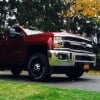Is Your Gmt-900 Truck Or Suv Using Oil
Is your GMT-900 using oil
1,554 members have voted
-
Recently Browsing 0 members
- No registered users viewing this page.
-
Forum Statistics
246k
Total Topics2.6m
Total Posts -
Member Statistics
-
Who's Online 22 Members, 1 Anonymous, 1,857 Guests (See full list)














Recommended Posts
Join the conversation
You can post now and register later. If you have an account, sign in now to post with your account.